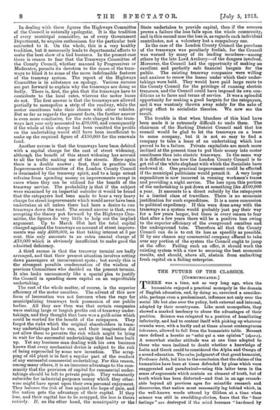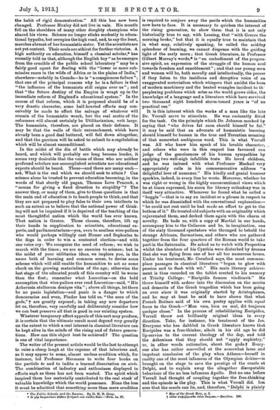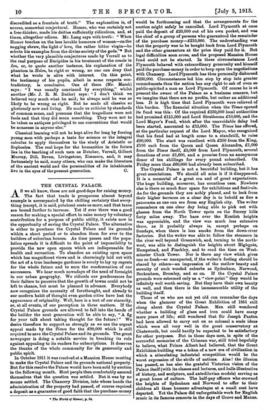T HERE was a time, not so very long ago, when
the humanists enjoyed a practical monopoly in the domain of English education, and, by doing so, exercised a consider- able, perhaps even a predominant, influence not only over the social life but also over the policy, both external and internal, adopted by their countrymen. Like most monopolists, they showed a marked tendency to abuse the advantages of their position. Science was relegated to a position of humiliating inferiority, and had to content itself with picking up whatever crumbs were, with a lordly and at times almost contemptuous tolerance, allowed to fall from the humanistic table. Bossnet once defined a heretic as " celui qui a sine opinion" (4erts). A somewhat similar attitude was at one time adopted to those who were inclined to doubt whether a knowledge of Latin and Greek could be considered the Alpha and Omega of a sound education. The calm judgment of that great humanist; Professor Jebb, led him to the conclusion that the claims of the humanities have been at times defended by pleas which were exaggerated and paradoxical—using this latter term in the sense of arguments which contain an element of truth, but of truth which has been distorted—and that in an age remark- able beyond all previous ages for scientific research and discoveries, that nation must necessarily lag behind which, in the well-known words uttered by Gibbon at a time when science was still in swaddling-clothes, fears that the "finer feelings" are destroyed if the mind becomes "hardened by
the habit of rigid demonstration." All this has now been changed. Professor Huxley did not live in vain. His mantle fell on the shoulders of many other doughty champions who shared his views. Science no longer slinks modestly in educa- tional bypaths, but occupies the high road, and, to say the least, marches abreast of her humanistic sister. Yet the scientists are not yet content. Their souls are athirst for further• victories. A high authority on education, himself a classical scholar,* has recently told us that, although the English boy "as he emerges from the crucible of the public school laboratory " may be a fairly good agent for dealing with the "lower or more sub- missive races in the wilds of Africa or in the plains of India," elsewhere—notably in Canada—he is " a conspicuous failure "; that one of the principal reasons why he is a failure is that " the influence of the humanists still reigns over us " ; and that "the future destiny of the Empire is wrapt up in the immediate reform of England's educational system." In the course of that reform, which it is proposed should be of a very drastic character, some half-hearted efforts may con- ceivably be made to effect the salvage of whatever will remain of the humanistic wreck, but the real motto of the reformers will almost certainly be Utilitarianism, writ large. The humanists, therefore, are placed on their defence. It may be that the walls of their entrenchment, which have already been a good deal battered, will fall down altogether, and that the garrison will be asked to submit to a capitulation which will be almost unconditional.
In the midst of the din of battle which may already be heard, and which will probably ere long become louder, it seems very desirable that the voices of those who are neither profound scholars nor accomplished scientists nor educational experts should be heard. These—and there are many such— ask, What is the end which we should seek to attain ? Can science alone be trusted to prevent education becoming, in the words of that sturdy old pagan, Thomas Love Peacock, a "means for giving a fixed direction to stupidity "? The answer they, or many of them, give to these questions is that the main end of education is to teach people to think, and that they are not prepared to play false to their own intellects to such an extent as to believe that the national power of think- ing will not he impaired if it is deprived of the teaching of the most thoughtful nation which the world has ever known. That nation is Greece. These classes, therefore, lift up their hands in supplication to scientists, educational ex- perts, and parliamentarians—yea, even to soulless wire-pullers who would perhaps willingly cast Homer• and Sophocles to the dogs in order to win a contested election—and with one voice cry : We recognize the need of reform; we wish to march with the times ; we are no enemies to science ; but in the midst of your utilitarian ideas, we implore you, in the name both of learning and common sense, to devise some scheme which will still enable the humanities to act as some check on the growing materialism of the age; otherwise the last stage of the educated youth of this country will be worse than the first; remember what Lucretius—on the bold assumption that wire-pullers ever read Lucretius—said, "Hic Acherusia stultorum denique vita " ; above all things, let there be no panic legislation—and panic is a danger to which democracies and even, Pinder has told us, "the sons of the gods," j are greatly exposed ; in taking any new departure let us, therefore, very carefully and deliberately consider how we can best preserve all that is good in our existing system.
Whatever temporary effect appeals of this sort may produce, it is certain that the ultimate result must depend very greatly on the extent to which a real interest in classical literature can be kept alive in the minds of the rising and of future genera- tions. How can this object best be achieved? The question is one of vital importance.
The writer of the present article would be the last to attempt to raise a cheap laugh at the expense of that laborious and, as it may appear to some, almost useless erudition whicb, for instance, led Professor Hermann to write four books on the particle Its and to indite a learned dissertation on aerrds. The combination of industry and enthusiasm displayed in efforts well as these has not been wasted. The spirit which inspired them has materially contributed to the real stock' of valuable knowledge which the world possesses. None the less it must be admitted that something more than mere erudition • The Pul.lic Schools and the Empire. By D. H. B. Gray. 8eulaeeiour, 4,OPots. Vi;yorn nal 'maws Nits e.—Nero. ix. 27.
is required to conjure away the perils which the humanities now have to face. It is necessary to quicken the interest of the rising generation, to show them that it is not only historically true to say, with Leasing, that "with Greece the morning broke," but that it is equally true to maintain that in what may, relatively speaking, be called the midday splendour of learning, we cannot dispense with the guiding light of the early morn ; that Greek literature, in Professor Gilbert Murray's words,* is " an embodiment of the progres- sive spirit, an expression of the struggle of the human soul towards freedom and ennoblement" ; and that our young men and women will be, both morally and intellectually, the poorer if they listen to the insidious and deceptive voice of an exaggerated materialism which whispers that amidst the hum of modern machinery and the heated wrangles incident to th perplexing problems which arise as the world grows older, the knowledge of a language and a literature which have survived two thousand eight hundred storm-tossed years is "of no practical use."
It is this interest which the works of a man like the late Dr. Verrall serve to stimulate. He was eminently fitted for the task. On the principle which Dr. Johnson mocked by saying that "who drives fat oxen should himself be fat." it may be said that an advocate of humanistic learning should himself be human in the true and Terentian meaning of that somewhat ambiguous word. This is what Verrall was. All who knew him speak of his lovable character, and others who were in this respect less favoured can judge of the genuineness of his human sympathies by applying two well-nigh infallible teats. He loved children, and be was imbued with what Professor Mackail very appropriately calls in his commemorative address "a delightful love of nonsense." His kindly and genial humour sparkles, indeed, in every line be wrote. Moreover, whether he was right or wrong in the highly unconventional views which he at times expressed, his scorn for literary orthodoxy was in itself very attractive. Whenever he found what he called a "boggle "—that is to say an incident or a phrase in respect to which he was dissatisfied with the conventional explanation- " he could not rest until he had made an effort to get to the bottom of it." He treated old subjects with an originality which rejuvenated them, and decked them again with the charm of novelty. He bade us, with a copy of Martial in our hands, accompany hint to the Coliseum and be, in imagination, one of the sixty thousand spectators who thronged to behold the strange Africans, Sarmatians, and others who are gathered together from the four quarters of the Roman world to take part in the Saturnalia. He asked us to watch with Propertitia whilst the slumbers of his Cynthia were disturbed by dreams that she was flying from one of her all too numerous lovers. Under his treatment, Mr. Cor•nford says, the most common- place passages in classical literature " began to glow with passion and to flash with wit." His main literary achieve- ment is thus recorded on the tablet erected to his memory at Trinity College: "Euripidis famam vindicavit." He threw himself with ardour into the discussion on the merits and demerits of the Greek tragedian which has been going on ever since it was originally started by Aristophanes, and he may at least be said to have shown that what French Boileau said of his own poetry applies with equal force to the Greek—" Mon vera, hien ou mal, dit toujours quelque chose." In the process of rehabilitating Euripides, Verrall threw out brilliantly original ideas in every direction. Take, for instance, his treatment of the Ion. Everyone who has dabbled in Greek literature knows that Euripides was a free-thinker, albeit in his old age he did lip-service to the current theology of the day, and told the Athenians that they should not " apply sophistry," or, in other words rationalize, about the gods.i. Every- one also has rather marvelled at the somewhat lame and impotent conclusion of the play when Athene—herself in reality one of the most infamous of the Olympian deities—is brought on the stage to save the prestige of the oracle at Delphi, and to explain away the altogether disreputable behaviour of the no less infamous Apollo. But no one before Verrall had thought of coupling together the free-thinking and the episode is the play. This is what Verrall did. Ion sees that the oracle can lie, and, therefore, " Delphi is plainly • Mee of the Greek Rpie, p. 3. t sinus ervinVietarks roar dailAort.—Bacchae. 200.
discredited as a fountain of truth." The explanation is, of course, somewhat conjectural. Homer, who was certainly not a free-thinker, made his deities sufficiently ridiculous, and, at times, altogether odious. Mr. Lang says with truth : " When Homer touches on the less lovable humours of women—on the nagging shrew, the light o' love, the rather bitter virgin—he selects his examples from the divine society of the gods."• But whether the very plausible conjectures made by Verrall as to the real purpose of Euripides in his treatment of the oracle in /an, or, to quote another instance, his explanation of the phantom in Helen, be right or wrong, no one can deny that what he wrote is alive with interest. On this point, the testimony of his pupils, albeit in some respects con- tradictory, is conclusive. One of them (Mr. Marsh) says : " I was usually convinced by everything," whilst another (Mr. J. R. M. Butler) says : " I don't think we believed very much what he said; he always said he was as likely to be wrong as right. But he made all classics so gloriously new and living. He made us criticise by standards of common sense, and presume that the tragedians were not fools and that they did mean something. They were not to be taken as antiques privileged to use conventions that would be nonsense in anyone else."
Classical learning will not be kept alive for long by forcing young men with perhaps a taste for science or the integral calculus to apply themselves to the study of Aristotle or Sophocles. The real hope for the humanities in the future lies in the teaching of such men as Butcher, Verrall, Gilbert Murray, Dill, Bevan, Livingstone, Zimmern, and, it may fortunately be said, many others, who can make the literature of the ancient world and the personalities of its inhabitants live in the eyes of the present generation. C.




















































 Previous page
Previous page